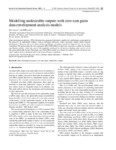Por favor, use este identificador para citar o enlazar este ítem:
http://www.alice.cnptia.embrapa.br/alice/handle/doc/657458Registro completo de metadatos
| Campo DC | Valor | Lengua/Idioma |
|---|---|---|
| dc.contributor.author | GOMES, E. G. | pt_BR |
| dc.date.accessioned | 2011-04-09T12:48:18Z | - |
| dc.date.available | 2011-04-09T12:48:18Z | - |
| dc.date.created | 2010-02-10 | pt_BR |
| dc.date.issued | 2008 | pt_BR |
| dc.identifier.citation | Journal of the Operational Research Society, v.59, n.2, p. 616-623, 2008. | pt_BR |
| dc.identifier.uri | http://www.alice.cnptia.embrapa.br/alice/handle/doc/657458 | pt_BR |
| dc.description | Data envelopment analysis (DEA) literature has proposed alternative models for performance assessment in the presence of undesirable outputs, such as pollutant emissions, where increased outputs imply reduced performance. However, the case where global equilibrium of outputs should be imposed has not yet been considered. We propose that the zero sum gains DEA (ZSG-DEA) models look especially suitable for treating equilibrium models, where the sum of the quantities produced by all decision-making units can be set as the upper admissible bound. This paper uses ZSG-DEA models to evaluate the carbon dioxide emission case study, which can be considered part of the Kyoto Protocol statement. | pt_BR |
| dc.language.iso | eng | eng |
| dc.rights | openAccess | eng |
| dc.subject | Data envelopment analysis | pt_BR |
| dc.subject | Zero sum gains | pt_BR |
| dc.subject | Undesirable outputs | pt_BR |
| dc.title | Modelling undesirable outputs with zero sum gains data envelopment analysis models. | pt_BR |
| dc.type | Artigo de periódico | pt_BR |
| dc.date.updated | 2011-04-10T11:11:11Z | pt_BR |
| riaa.ainfo.id | 657458 | pt_BR |
| riaa.ainfo.lastupdate | 2010-07-08 | pt_BR |
| dc.contributor.institution | ELIANE GONCALVES GOMES, SGE. | pt_BR |
| Aparece en las colecciones: | Artigo em periódico indexado / Embrapa Unidades Centrais (AI-SEDE)  | |
Ficheros en este ítem:
| Fichero | Descripción | Tamaño | Formato | |
|---|---|---|---|---|
| Modellingundesirableoutputs.pdf | 124,18 kB | Adobe PDF |  Visualizar/Abrir |









